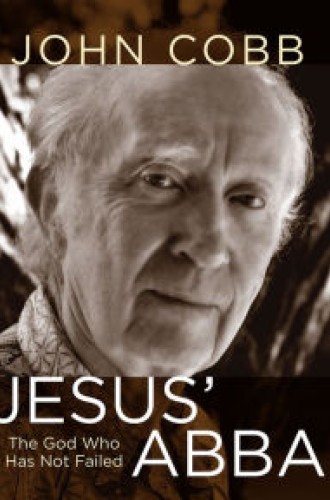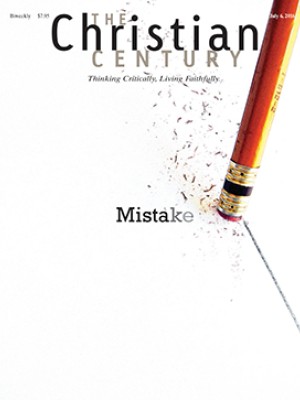Cradled by God
The word Abba could be imagined as a baby’s first syllables. In Matthew 18, Jesus tells his disciples that to be oriented to the kingdom of heaven they must turn from their disagreements and become like trusting children. In the following chapter Jesus receives little children into his arms as if they were peers or family members. He notices them, blesses them, and declares that their innocence makes them heirs of the kingdom. Abba’s spirit at work in the world, John Cobb believes, is like the relationship of love and trust between a young child and a parent. Convinced that these commitments were central to Jesus’ faith, Cobb culminates some 60 years of writing with a personal testimony to his own awareness of Abba.
This book is like a casual evening conversation that treats theology seriously as a matter of importance for Christians and the wider world. Cobb revisits topics that will be familiar to his students and loyal readers—including faith and science, interfaith dialogue, and the environmental crisis. A sympathetic friend of feminist experiments in crafting gender-free language for Christian worship, Cobb acknowledges the lessons of equality taken from these projects over the years. Accordingly, he emphasizes as Abba’s essential characteristic the loving attention and care that a mother or father might give to an infant.
Read our latest issue or browse back issues.
Cobb’s aim is to direct liberal Christians toward devotion to the biblical God, whom Jesus knew as Abba. He reads the Bible as a book of history and life (including the 90-plus years of his own life), as a sequence of events that might be charted through historical analysis and reflection. Cobb believes that Abba, the God Jesus introduced to the world, still works for good in personal biographies such as his own, in cooperative communities such as the retirement community where he lives, and more broadly in society and in creation.
Throughout the book Cobb promotes the Jesus of scripture as a model for living worship of Abba. He cites such passages as Jesus’ cry in Mark 14 that he will stay true to Abba’s will even as agony unfolds before him in Jerusalem. At the same time, Cobb wishes to demote the Christ of the ancient creeds, a figure drawn by councils as an answer to questions and frozen in time as a rule or ordering principle. To Cobb, learning to love the God of the Bible might lead to the development of a historical consciousness that is sensitive to the spirit of that same love at work in the world.
Loving God as Jesus did means working with God over the course of a lifetime. The goal of this cooperative work—which might otherwise be called the life of faith—is the flourishing of all life, which Cobb defines as freedom of expression. The spirit of love and relationship is the principal power of Abba that fills living things with life and forms human beings into communities dedicated to the common good. This spirit allows people, creatures, communities, and societies to express themselves freely. Jesus’ disciples and the Christian congregations gathered by Paul model advocacy for this type of creative freedom.
After illustrating Jesus’ understanding of God as Abba, Cobb discusses what became of Abba over the course of history. For example, the medieval church—impressive in its insistence on loyalty to God and denial of the ultimate power of secular rulers, and remarkable for its innovations in education and marvels of sacred architecture—as a whole lost track of Abba. Still, in personal piety and devotion Abba was present. Cobb points out that in the Middle Ages the term God was reserved for an all-male trinity but Mary exhibited the essential features of Abba. St. Francis of Assisi served a similar role, maintaining creative public devotion to Abba as he embraced all people and other creatures of the earth.
The remarkable part of this book is not its theology or generalities about society. It’s Cobb’s commonsense faith that recognizes Abba’s forgiveness and reconciliation, both for the earliest Christians and for the author himself. He notes that Abba worked similarly through Jesus and Paul. They both served Abba, drawing people toward compassionate attention to others. Both Jesus’ and Paul’s service to Abba resulted in new communities dedicated to lives ordered by faith and outreach guided by righteousness. Then Cobb (often in moving descriptions) recounts his own experiences of Abba as companion, directing agent, and healing spirit who leads him forward and shapes his life.
Abba is not an object of study for Cobb, but rather a subject alive in the course of history. Just as the life of the world has a geologic history, nations have political and social histories, and individual human beings have life stories, so Abba has a history that can be experienced in nature, through human activities and communities, and intimately in biographies.
Cobb consistently elevates Jesus’ revolutionary prophet-inspired understanding of God as loving father, opposing the imperialistic stamp of God as almighty king. Presenting Jesus’ obedience to death on a cross as a form of faithfulness to Abba, he counters Anselm’s “poisonous” view of Jesus’ death as a sacrifice to appease the wrath of a righteous God. He writes in favor of local countercultural communities of discipleship which Jesus foreshadowed as the basileou theo and Paul developed under apostolic guidance. Such communities oppose the nationalistic, self-destructive tendencies of ancient Israel that iterate throughout Christian history.
This book also shows how Christians might open dialogue among people of different faiths by committing to Jesus’ Abba as a premise. Discussions between Jews, Muslims, and Christians might lead to a meeting in Abba as the one who called their common ancestors, Abraham and Sarah, forward in faith. In conversation with the wisdom religions of India and China, Christians might downplay the God of Abraham as cosmic ruler and angry judge in favor of Jesus’ Abba of love, in order to keep dialogue parties at the table and not cause offense. In a characteristically broad view, Cobb hopes that Abba might help forge new alliances between diverse populations of Earth and cross-fertilize ideas for the flowering of hybrid religious thought for the benefit of all.







